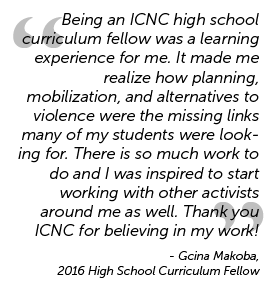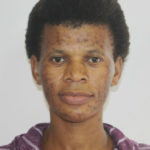Gcina Makoba, an ICNC High School Curriculum Fellow, developed, offered and moderated a course on the introduction to civil resistance in 2016 as part of  the ICNC High School Curriculum Fellowship.
the ICNC High School Curriculum Fellowship.
The information featured below was submitted as part of the fellowship requirement that, among others, included creating a detailed course proposal, developing curriculum content, designing evaluation tools, selecting participants and extensive moderation throughout the course.
 Gcina Makoba lives in the outskirts of the city of Durban in the Province of KwaZulu-Natal, South Africa, where she finished her high school education. Despite the systematic barriers of the past, she was able to obtain a Diploma in Education, a Diploma in Politics and Social Development, Participatory Action Research in Workers’ College, a B. Social Science in University of KwaZulu-Natal(UKZN), and is currently doing her Master of Development in the same institution, UKZN.
Gcina Makoba lives in the outskirts of the city of Durban in the Province of KwaZulu-Natal, South Africa, where she finished her high school education. Despite the systematic barriers of the past, she was able to obtain a Diploma in Education, a Diploma in Politics and Social Development, Participatory Action Research in Workers’ College, a B. Social Science in University of KwaZulu-Natal(UKZN), and is currently doing her Master of Development in the same institution, UKZN.
Course Title: Peaceful Resistance
High School: Imvaba High School, South Africa
Abstract: The course is an exciting, intense summary of peaceful resistance; it touches on the histories and the interrelationships among the Sub Saharan African countries, with the common feature of resisting the same injustice, colonialism, while denoting nonviolent resistance as an ever existing phenomenon in this part of the continent. It gradually introduces the tactics, strategies, advantages and disadvantages while teaching the reasons behind its effectiveness. The course gets into grips with the reality of unfavorable conditions that sometimes exist, and what can lead to mobilization backfiring through examining the dynamics that usually unfold. As the course gives the reasons of why peaceful resistance works, it also forces students who otherwise might have thought that a violent way of responding to injustices is the right or effective means of struggle to openly discuss and consider alternative stories and perspectives that are centered around nonviolent resistance actions.
Learning Gains Survey Results:
ICNC does not have Learning Gains Survey results to display for this fellow. However, 72% of students in the course reported that the knowledge they had gained in the course was helpful for them and 69% reported that they knew more about civil resistance post course than they had before the course began.
Go back to the main ICNC High School Curriculum Fellowship page.